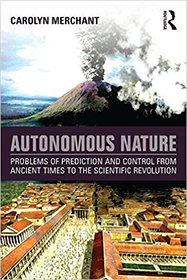Autonomous Nature by Carolyn Merchant

Professor of Environmental Science, Policy, and Management Carolyn Merchant’s forthcoming book, Autonomous Nature: Problems of Prediction and Control from Ancient Times to the Scientific Revolution (Routledge, 2016), was influenced in part by her 2012 Townsend Collaborative Research Seminar, organized with Francesca Rochberg, Near Eastern Studies, and titled “Nature/No Nature: Rethinking the Past, Present, and Future of Nature in the Contemporary Humanities.”
Autonomous Nature explores the tension between unruly nature and humankind’s attempt to impose an ordered, rational view of it from antiquity to the Scientific Revolution.
In a recent interview Merchant discussed the origins of her work:
At the Earth Summit in Rio de Janeiro in 1992, I formulated what I called a "partnership ethic" in which "humans as the bearers of ethics, would acknowledge nonhuman nature as an autonomous actor that cannot be predicted or controlled except in very limited domains."
[A]though climate change is largely anthropogenically caused and scientists can model and predict much of its extent, many outcomes are the result of unanticipated tipping points and complex cascading effects that, even if predicted, cannot be controlled. Because of the complexities of oceanic and atmospheric interactions, the moments, locations, results, and long-term effects of weather and climate make decision-making highly problematic …. The long-term future of the earth itself is at stake.
In Spring 2016, Merchant and Anne-Lise François (English and Comparative Literature) convene with four other UC Berkeley faculty members a graduate-level Townsend Collaborative Research Seminar, “The Fate of Nature in the Anthropocene.” The seminar brings together faculty and graduate students from the humanities and environmental sciences to develop a theoretical framework for the environmental humanities and to examine possibilities for an integrated approach to the recent environmental turn in the humanities.
Among other works, Carolyn Merchant is author of Reinventing Eden: The Fate of Nature in Western Culture (Routledge. 2013, 2nd edition), and Ecological Revolutions: Nature, Gender, and Science in New England (North Carolina, 2010, 2nd edition).